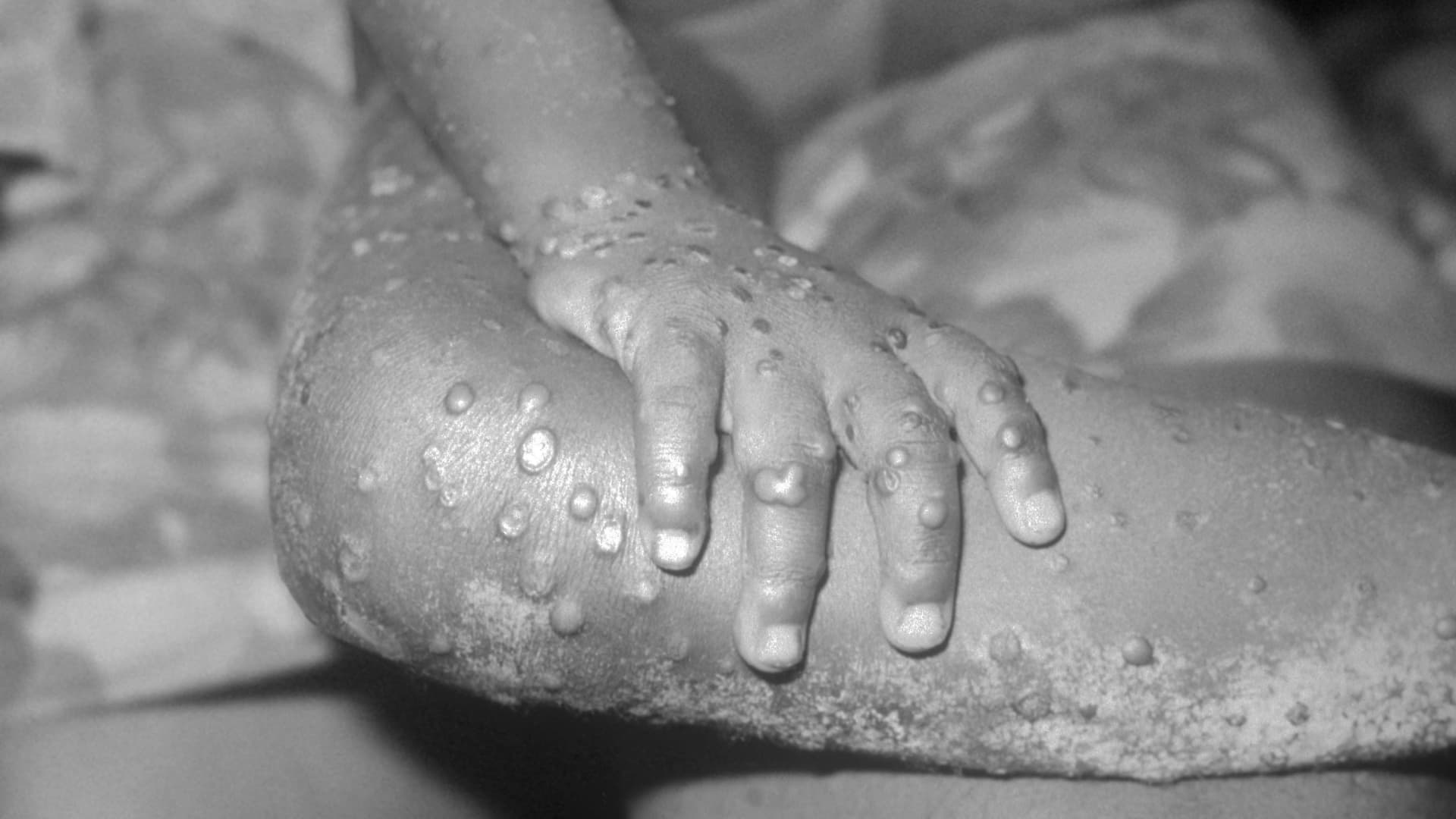Belgium becomes first country to introduce mandatory monkeypox quarantine as global cases rise
In this 1971 Center For Disease Control handout photo, monkeypox-like lesions are shown on the arm and leg of a female child in Bondua, Liberia.
CDC | Getty Images
Belgium has become the first country to introduce a mandatory 21-day quarantine for monkeypox patients as cases of the disease — typically endemic to Africa — spread across the globe.
Health authorities in Belgium introduced the measures Friday after reporting its third case of the virus. As of Monday, the country has recorded four local cases; confirmed global infections currently number around 100.
Belgium’s compulsory measures apply only to patients with a confirmed infection. Close contacts are not required to self-isolate but are encouraged to remain vigilant, especially if in contact with vulnerable people.
“Infected persons will have to go into contact isolation until the injuries have healed (they will receive concrete instructions about this from the treating doctor),” a translated version of the government announcement said.
The U.K. meanwhile has said those who have a high risk of catching the disease should self-isolate for 21 days. That includes household contacts or medical professionals who may have come into contact with an infected patient.
What is monkeypox?
Monkeypox is a rare disease caused by the monkeypox virus — part of the smallpox family — with symptoms including rashes, fever, headaches, muscle ache, swelling and backpain.
Though typically less severe than smallpox, health experts are growing concerned about the genesis of a recent outbreak, starting in early May, in countries beyond Central and West Africa.
Health authorities, including the U.S. Centers for Disease Control and infection and the U.K.’s Health Security Agency, said they have noted a particular concentration of cases among men who have sex with men, and urged gay and bisexual men in particular to be aware of any unusual rashes or lesions.
As of Saturday, the World Health Organization reported that there were 92 cases in 12 countries, and a further 28 suspected cases under investigation. The U.S., U.K., Canada, Australia, Germany, France, Italy, Spain, Sweden, Belgium, Portugal and Netherlands have all confirmed cases.
In this Centers for Disease Control and Prevention handout graphic, symptoms of one of the first known cases of the monkeypox virus are shown on a patient?s hand May 27, 2003.
CDC | Getty Images
The public health body said recent reported cases had no links to travel from endemic African countries, which is unusual for the disease. It usually spreads via human-to-human or human-to-animal contact.
“Epidemiological investigations are ongoing, however, reported cases thus far have no established travel links to endemic areas,” the WHO said in a statement posted on its website Saturday.
“Based on currently available information, cases have mainly but not exclusively been identified amongst men who have sex with men (MSM) seeking care in primary care and sexual health clinics,” it added.
More monkeypox cases likely
The recent surge in community cases, particularly within urban areas, is now raising concerns of a wider outbreak.
“To have it appear now — more than 100 cases in 12 different countries with no obvious connection — means we have to figure out exactly what’s happening,” Seth Berkley, CEO of global vaccine alliance Gavi, told CNBC Monday.
“The truth is we don’t know what that is and therefore how severe it’s going to be. But it’s likely that we’re going to see more cases,” he said.
Though most cases of monkeypox are mild and typically resolve within 2 to 4 weeks, there is currently no proven vaccine. The smallpox vaccine has proven 85% effective in preventing infection, and some countries have already begun stockpiling doses.
Berkley cautioned that the new outbreak, occurring even as the existing coronavirus pandemic is “not over yet,” was a warning to authorities to invest more resources into infectious diseases. He was speaking on the sidelines of the World Economic Forum in Davos, where political and business leaders have gathered this week to key global issues, including pandemic preparedness.
“This is evolutionarily certain that we’re going to see more outbreaks,” he said. “That’s why pandemic preparedness is so important. Look at what it can do economically when you have a pandemic hit”
For all the latest health News Click Here

